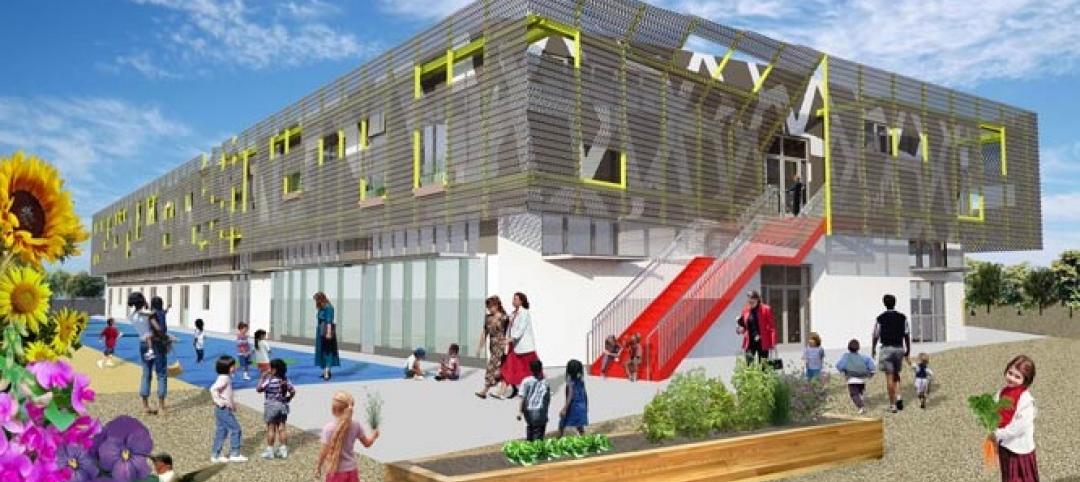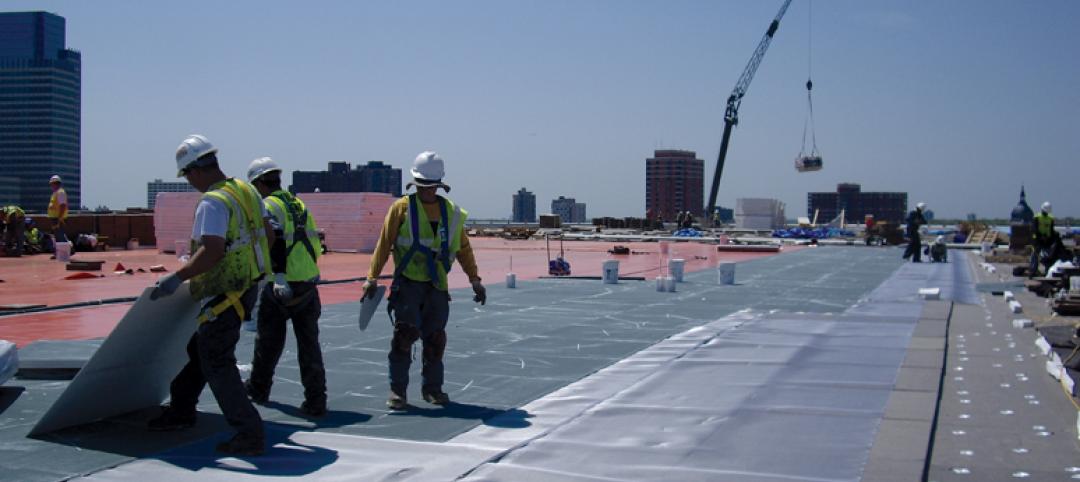Founded in 2009 with an initial endowment of $1.9 million, HMC’s nonprofit Designing Futures Foundation (DFF) has donated about $230,000 in its three years of existence, including $105,000 in scholarships to California students. The grants help promising high schoolers with an interest in architecture, design, engineering, education, or healthcare pay for expenses like test preparation services, computers, and college entrance exam fees and tuition. The scholarships can be extended for up to five years of college.
Executive Director Adrienne Luce says the foundation serves as an extension of HMC’s social responsibility. The DFF’s Community Project initiative provides grants of up to $10,000 to HMC employees for projects for that benefit the communities in which they live and work.
For example, three HMC employees—Pablo La Roche, PhD, LEED AP, Sustainable Design Director; Eera Babtiwale, LEED AP BD+C, Environmental Analyst; and Sandy Kate, REFP, LEED AP, Associate Principal/Senior Education Facilities Planner—proposed a sustainability education program at McKinley Elementary School in Santa Monica. The DFF sponsored nine workshops for 220 McKinley students in grades 3-5 over three days, providing 13½ hours of instruction on energy, water, and waste.
The DFF has funded scholarship programs at Ramona High School, a healthcare academy in Riverside, Calif., and at the Center for Advanced Research and Technology, in Fresno. The DFF also supports Bright Prospect, a college access and retention program in Pomona, and hosted a career day for students aspiring to become architects, engineers, or designers, topped off by a tour of the Ontario office.
Scott Plante, AIA, LEED AP, Senior Project Designer, won a $7,500 DFF grant to help restore the historic Micheltorena Steps in Silver Lake, the vintage 1920s-LA neighborhood where he lives. “The steps are on a main route to the school, and they’re in a state of disrepair,” says Plante, who serves on the Silver Lake Urban Design Committee. The $24,000 project, with donations from the DFF, the Silver Lake Neighborhood Council, and the Safe Routes to Schools program, plus a lighting upgrade by the local water and power utility, will be completed in two phases starting next June.
See the video about the DFF and the Micheltorena Steps project at: www.BDCnetwork.com/HMC/DFF.
At the university level, the Designing Futures Foundation has:
- Provided a $10,000 seed grant to help Cal Poly Pomona start a healthcare architecture studio, the first of its kind west of the Mississippi.
- Worked with Harvey Mudd College and the California Institute of the Arts on a project that uses online games and resources to foster greater environmental responsibility among college students.
- Funded an $18,000 water demonstration garden at Norco College, a two-year institution in Riverside.
- Sponsored research by HMC staff and consulting experts at UC San Diego’s Calit2 StarCAVE virtual reality environment on the effects of the built environment on building users. +
Related Stories
| Feb 15, 2011
Iconic TWA terminal may reopen as a boutique hotel
The Port Authority of New York and New Jersey hopes to squeeze a hotel with about 150 rooms in the space between the old TWA terminal and the new JetBlue building. The old TWA terminal would serve as an entry to the hotel and hotel lobby, which would also contain restaurants and shops.
| Feb 15, 2011
New Orleans' rebuilt public housing architecture gets mixed reviews
The architecture of New Orleans’ new public housing is awash with optimism about how urban-design will improve residents' lives—but the changes are based on the idealism of an earlier era that’s being erased and revised.
| Feb 15, 2011
LAUSD commissions innovative prefab prototypes for future building
The LA Unified School District, under the leadership of a new facilities director, reversed course regarding prototypes for its new schools and engaged architects to create compelling kit-of-parts schemes that are largely prefabricated.
| Feb 15, 2011
New 2030 Challenge to include carbon footprint of building materials and products
Architecture 2030 has just broadened the scope of its 2030 Challenge, issuing an additional challenge regarding the climate impact of building products. The 2030 Challenge for Products aims to reduce the embodied carbon (meaning the carbon emissions equivalent) of building products 50% by 2030.
| Feb 15, 2011
New Urbanist Andrés Duany: We need a LEED Brown rating
Andrés Duany advocates a "LEED Brown" rating that would give contractors credit for using traditional but low cost measures that are not easy to quantify or certify. He described these steps as "the original green," and "what we did when we didn't have money." Ostensibly, LEED Brown would be in addition to the current Silver, Gold and Platinum ratings.
| Feb 15, 2011
AIA on President Obama's proposed $1 billion investment in energy conservation
The President’s budget increases the value of investment in energy conservation in commercial buildings by roughly $1 billion, reports AIA 2011 President Clark Manus, FAIA. The significant increase from the current tax deduction of $1.80 per sq. ft. now on the books is an increase for which the AIA has been advocating in order to encourage energy conservation.
| Feb 14, 2011
Sustainable Roofing: A Whole-Building Approach
According to sustainability experts, the first step toward designing an energy-efficient roofing system is to see roof materials and systems as an integral component of the enclosure and the building as a whole. Earn 1.0 AIA/CES learning units by studying this article and successfully completing the online exam.
| Feb 11, 2011
Four Products That Stand Up to Hurricanes
What do a panelized wall system, a newly developed roof hatch, spray polyurethane foam, and a custom-made curtain wall have in common? They’ve been extensively researched and tested for their ability to take abuse from the likes of Hurricane Katrina.













